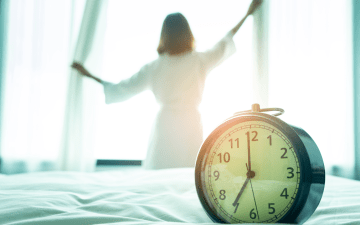Foods That Help You Sleep

Explore the relationship between diet and sleep quality and learn more about how certain foods and nutrients can influence one's ability to fall asleep and stay asleep throughout the night.
The path to a better night’s sleep may go through your stomach. That’s because what you eat, and when you consume it, can affect your ability to fall asleep quickly and stay asleep through the night.
Some foods and drinks have nutrients that promote sleep, while others have characteristics that can delay drifting off to slumberland. In this article, we’ll break it down for you as to what you should - and shouldn’t - be eating before bedtime if you want to get a good night’s sleep.
Role of Serotonin
A chemical in our bodies called serotonin carries messages from the brain to the rest of the body, telling it how to work. Serotonin helps regulate your mood, digestion, and sleep.
Low levels of serotonin can cause sleep problems. Likewise, increasing serotonin naturally can produce better sleep. The brain also needs serotonin to make melatonin, a hormone that controls when we go to sleep and wake up.
Serotonin is made from an amino acid called tryptophan. Eating foods that contain tryptophan is a good way to boost serotonin levels - which in turn can help you sleep.
Foods With Tryptophan
Anyone who has eaten a big turkey dinner, like at Thanksgiving, and dozed off afterwards has experienced what tryptophan can do. Turkey has high levels of tryptophan.
Having turkey for supper would be one way to sleep better. Fortunately, eating turkey is not the only way to get tryptophan. Other foods that contain tryptophan include:
- Milk
- Tuna
- Chicken
- Oats and oatmeal
- Cheese
- Peanuts and other nuts and seeds
- Bread
- Chocolate
- Bananas, apples, and other fruits
Tryptophan is important for promoting sleep, but it’s not the only thing you should be looking for when deciding what to eat before bedtime. Foods that contain melatonin and magnesium (which helps regulate melatonin) can also be helpful. Tart cherries, bananas, milk, oats, and nuts have melatonin in them.
Snack Suggestions
Snacking on healthy foods containing key nutrients in the evening can help your body prepare for sleep. Here are some suggestions for a small before-bed snack:
- A banana with low-fat yogurt
- Banana with no-added-sugar nut butter
- Greek-style yogurt or frozen kefir sprinkled with chopped nuts
- Low-fat cottage cheese with whole-grain pita chips
- Peanut butter on whole-grain crackers
- Apple with mozzarella string cheese
- Tart cherry juice
- Yogurt parfait with tart cherries and walnuts
- Oatmeal with milk
Kiwi fruit is a food that has gotten some attention for its potential to help promote good sleep. Kiwi contains serotonin, melatonin, and other beneficial nutrients. A study that involved 24 people who ate kiwi an hour before bedtime for four weeks found that people reported falling asleep faster and staying asleep longer. More research is needed, but you may want to try adding kiwi to your evening snack to see if it works for you.
Other things to keep in mind:
- Avoid foods and drinks containing caffeine in the late afternoon and evening, as caffeine is a stimulant that can keep you awake. Caffeine may be in coffee, tea, and soda. Also be aware that foods flavored with coffee and chocolate have caffeine in them.
- Don’t eat a heavy meal close to bedtime, as it may cause indigestion that keeps you up. For the same reason, don’t eat spicy foods before bed.
- Avoid sugary beverages and sweets in the evening, as sugar produces energy, which can stimulate you and cause sleep loss.
As for the timing of your before-bed snack, there doesn’t seem to be any consensus on what is optimal. But you should have your snack at least 30 minutes before hitting the hay, so that the nutrients have a chance to be absorbed into your body by the time you’re drifting off and can help you have a better night’s sleep.



